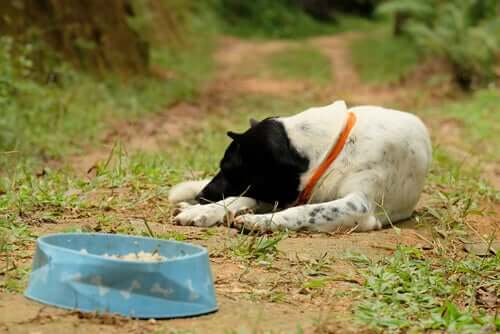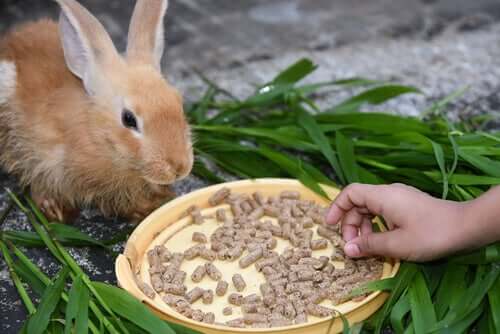Which Animals Can Suffer from Anorexia?

Anorexia is a term used to describe the situation when we or our pets lose our appetites. In these cases, it may mean that an animal doesn’t want to eat, or that it can’t eat. In the article below, we’ll talk about which animals may suffer from anorexia, as well as the effects of this condition.
But before we go any deeper on this issue, it’s important to clarify that “appetite” and “hunger” aren’t the same thing. On the one hand, hunger awakens a physiological need for food in our bodies. On the other hand, appetite is more of a psychological issue and depends on memory and association.

What possible causes can lead animals to suffer from anorexia?
There are many reasons a pet may suffer from anorexia, but the most common causes are:
- Cancer
- Internal parasites
- An infection of the tongue
- Inflammatory ulcers
- Dental diseases
- Swollen tonsils
- The presence of a foreign body
- Infections that produce fever
- Any illness of the stomach or the intestines
Other causes that can lead to anorexia in domestic animals:
- Stress, related to loud, booming noises like fireworks and thunderstorms, can cause anorexia.
- Territorial animals, like cats, may stop eating if they feel intimidated by the presence of another cat in their home.
- Arthritic pets, pets that have recently had an operation, or those that are experiencing some pain in their bodies may also suffer from anorexia.
How will the veterinarian respond?
Depending on the symptoms that your pet displays, your veterinarian will determine what measures best fit the circumstances. However, he or she will likely do the following:
- Most veterinarians will start by asking some basic questions in order to better understand the problem. For example: When did you first notice the anorexia or decrease in your animal’s appetite? How is your pet’s appetite normally?
- Then, he or she will conduct a physical evaluation of your pet.
- If the veterinarian sees fit, he or she will carry out certain lab work. Blood exams as well as the analysis of urine and feces may help to clarify the suspicion of any underlying illnesses.
- The vet will take x-rays of your pet. These images can be useful in these cases, especially if the vet suspects orthopedic pain, cancer, or gastrointestinal disorders.

Anorexia in dogs
If your dog seems temporarily uninterested in eating, there’s no reason to worry right away. Just like humans, sometimes dogs just aren’t hungry.
Sometimes, a stressful situation or an upset stomach can be to blame. These situations usually take care of themselves within a day. However, if more than 48 hours go by and your dog still won’t eat, then you should see a veterinarian right away .
What’s most concerning is when a dog that’s usually enthusiastic about eating loses interest. This sudden loss of appetite is a sign that something’s wrong.
Cats can also suffer from anorexia
Cats enjoy living a predictable routine, and any change can cause them to lose their appetite. Traveling, moving, or even the arrival of a new baby or pet can produce stress in cats. On many occasions, they respond to this stress by refusing to eat .
It’s also important to keep in mind that, if your cat won’t eat, it may a sign of some illness. Infections, pancreatitis, kidney failure, feline cancer, and intestinal problems can all drive a cat to stop eating.
Anorexia is peculiar in snakes
With the exception of some female snakes just before they lay their eggs, and snakes that are subjected to planned hibernation, it’s not normal for snakes in captivity to refuse the eat for more than one or two months. Many snakes from warm climates tend to reduce how much they eat in the fall as daylight decreases.
Often, snakes stop eating temporarily when they are about to shed their skin. It’s worth pointing out that, just before molting, snakes may not be able to see very well and become irritable. However, once the process is over, a snake’s appetite goes back to normal.
However, if snakes continue to be anorexic for a month or several weeks, it may be an indication of infection. Anorexia is a sign that snakes don’t feel safe enough in their cages.
Anorexia in rabbits can be serious

In general, rabbits want to chew on and eat anything that’s within their reach. However, when pet rabbits suddenly become apathetic and display disinterest in eating, this may be the sign of an emergency situation.
The fact that a dog, cat, or other pet skips a meal isn’t really a reason for alarm. However, when it comes to rabbits, it may a sign of a problem that requires immediate attention.
The most common cause for a lack of appetite in rabbits is a problem known as gastroparesis or delayed stomach emptying. This occurs when the peristalsis (the intestinal contractions that push foods through the gastrointestinal tract) slow down or stop altogether. In rabbits, this is extremely dangerous and can lead to death if not treated correctly .
One final note
As you can see, some animals may suffer from anorexia at certain times or under a variety of circumstances. Therefore, it’s important to be well-informed, depending on the type of pet you have. That way, you’ll know when it’s time to see a veterinarian for an immediate physical examination.
All cited sources were thoroughly reviewed by our team to ensure their quality, reliability, currency, and validity. The bibliography of this article was considered reliable and of academic or scientific accuracy.
- Stella, J., Croney, C., & Buffington, T. (2013).Effects of stressors on the behavior and physiology of domestic cats.Applied Animal Behaviour Science, 143(2), 157–163.
- Harcourt-Brown, F. (2002).Anorexia in rabbits 1. Causes and effects. In Practice, 24(7), 358–367.
- Boyer, T. H., & Boyer, D. M. (1993).Breeding Season Anorexia in Male Snakes.Bulletin of theAssociation of Reptilian and AmphibianVeterinarians, 3(1), 6–6.
- Delaney, S. J. (2006).Management of anorexia in dogs and cats. Veterinary Clinics of North America-Small Animal Practice, 36(6), 1243–1249.
